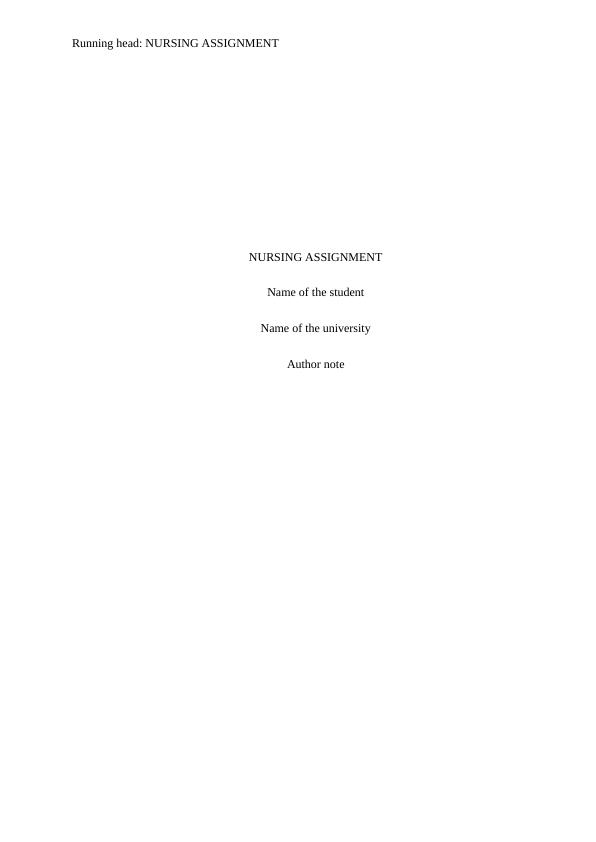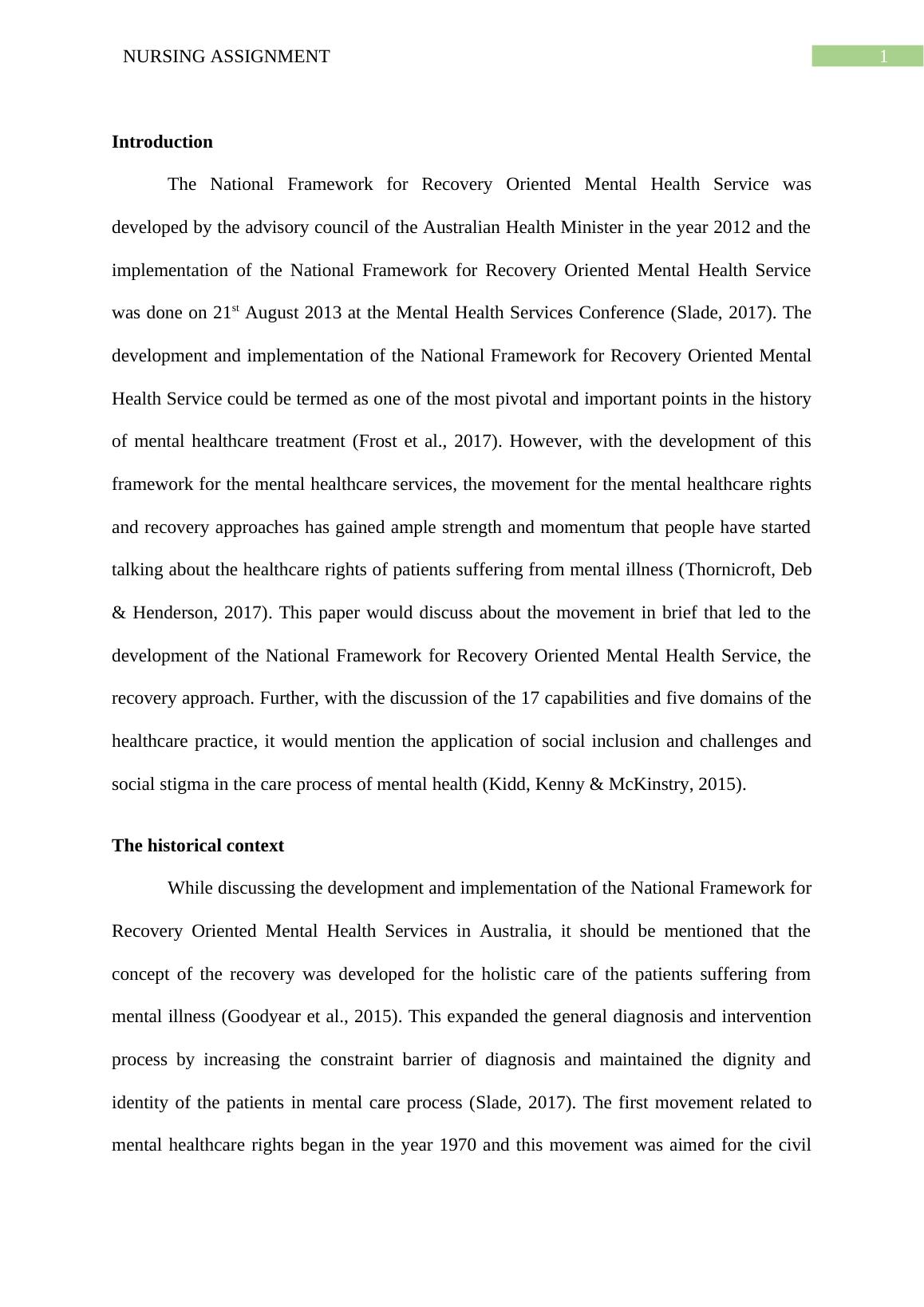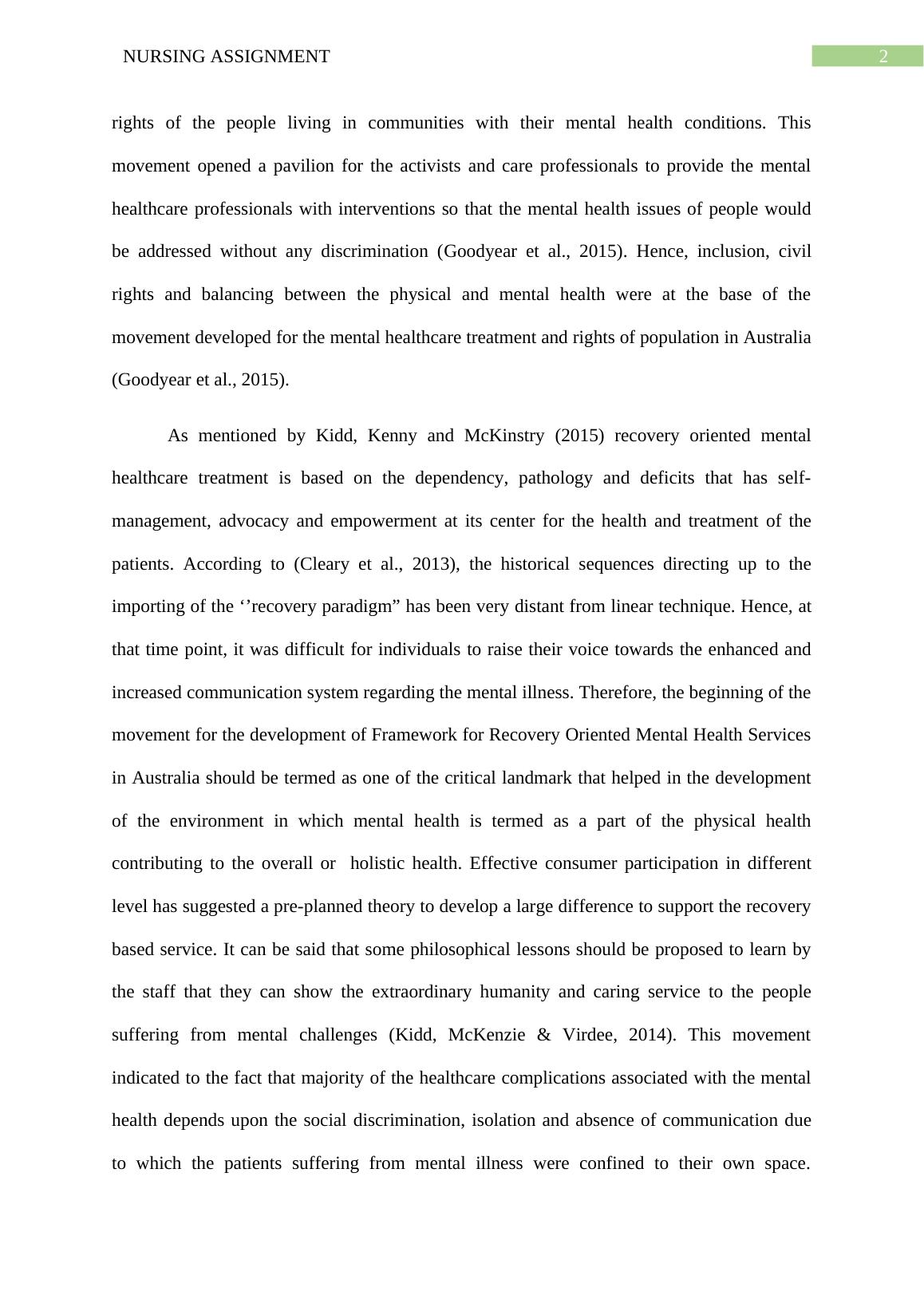Implementation of the National Framework for Recovery Oriented Mental Health Service
Added on 2022-10-16
10 Pages2691 Words144 Views
Running head: NURSING ASSIGNMENT
NURSING ASSIGNMENT
Name of the student
Name of the university
Author note
NURSING ASSIGNMENT
Name of the student
Name of the university
Author note

NURSING ASSIGNMENT1
Introduction
The National Framework for Recovery Oriented Mental Health Service was
developed by the advisory council of the Australian Health Minister in the year 2012 and the
implementation of the National Framework for Recovery Oriented Mental Health Service
was done on 21st August 2013 at the Mental Health Services Conference (Slade, 2017). The
development and implementation of the National Framework for Recovery Oriented Mental
Health Service could be termed as one of the most pivotal and important points in the history
of mental healthcare treatment (Frost et al., 2017). However, with the development of this
framework for the mental healthcare services, the movement for the mental healthcare rights
and recovery approaches has gained ample strength and momentum that people have started
talking about the healthcare rights of patients suffering from mental illness (Thornicroft, Deb
& Henderson, 2017). This paper would discuss about the movement in brief that led to the
development of the National Framework for Recovery Oriented Mental Health Service, the
recovery approach. Further, with the discussion of the 17 capabilities and five domains of the
healthcare practice, it would mention the application of social inclusion and challenges and
social stigma in the care process of mental health (Kidd, Kenny & McKinstry, 2015).
The historical context
While discussing the development and implementation of the National Framework for
Recovery Oriented Mental Health Services in Australia, it should be mentioned that the
concept of the recovery was developed for the holistic care of the patients suffering from
mental illness (Goodyear et al., 2015). This expanded the general diagnosis and intervention
process by increasing the constraint barrier of diagnosis and maintained the dignity and
identity of the patients in mental care process (Slade, 2017). The first movement related to
mental healthcare rights began in the year 1970 and this movement was aimed for the civil
Introduction
The National Framework for Recovery Oriented Mental Health Service was
developed by the advisory council of the Australian Health Minister in the year 2012 and the
implementation of the National Framework for Recovery Oriented Mental Health Service
was done on 21st August 2013 at the Mental Health Services Conference (Slade, 2017). The
development and implementation of the National Framework for Recovery Oriented Mental
Health Service could be termed as one of the most pivotal and important points in the history
of mental healthcare treatment (Frost et al., 2017). However, with the development of this
framework for the mental healthcare services, the movement for the mental healthcare rights
and recovery approaches has gained ample strength and momentum that people have started
talking about the healthcare rights of patients suffering from mental illness (Thornicroft, Deb
& Henderson, 2017). This paper would discuss about the movement in brief that led to the
development of the National Framework for Recovery Oriented Mental Health Service, the
recovery approach. Further, with the discussion of the 17 capabilities and five domains of the
healthcare practice, it would mention the application of social inclusion and challenges and
social stigma in the care process of mental health (Kidd, Kenny & McKinstry, 2015).
The historical context
While discussing the development and implementation of the National Framework for
Recovery Oriented Mental Health Services in Australia, it should be mentioned that the
concept of the recovery was developed for the holistic care of the patients suffering from
mental illness (Goodyear et al., 2015). This expanded the general diagnosis and intervention
process by increasing the constraint barrier of diagnosis and maintained the dignity and
identity of the patients in mental care process (Slade, 2017). The first movement related to
mental healthcare rights began in the year 1970 and this movement was aimed for the civil

NURSING ASSIGNMENT2
rights of the people living in communities with their mental health conditions. This
movement opened a pavilion for the activists and care professionals to provide the mental
healthcare professionals with interventions so that the mental health issues of people would
be addressed without any discrimination (Goodyear et al., 2015). Hence, inclusion, civil
rights and balancing between the physical and mental health were at the base of the
movement developed for the mental healthcare treatment and rights of population in Australia
(Goodyear et al., 2015).
As mentioned by Kidd, Kenny and McKinstry (2015) recovery oriented mental
healthcare treatment is based on the dependency, pathology and deficits that has self-
management, advocacy and empowerment at its center for the health and treatment of the
patients. According to (Cleary et al., 2013), the historical sequences directing up to the
importing of the ‘’recovery paradigm” has been very distant from linear technique. Hence, at
that time point, it was difficult for individuals to raise their voice towards the enhanced and
increased communication system regarding the mental illness. Therefore, the beginning of the
movement for the development of Framework for Recovery Oriented Mental Health Services
in Australia should be termed as one of the critical landmark that helped in the development
of the environment in which mental health is termed as a part of the physical health
contributing to the overall or holistic health. Effective consumer participation in different
level has suggested a pre-planned theory to develop a large difference to support the recovery
based service. It can be said that some philosophical lessons should be proposed to learn by
the staff that they can show the extraordinary humanity and caring service to the people
suffering from mental challenges (Kidd, McKenzie & Virdee, 2014). This movement
indicated to the fact that majority of the healthcare complications associated with the mental
health depends upon the social discrimination, isolation and absence of communication due
to which the patients suffering from mental illness were confined to their own space.
rights of the people living in communities with their mental health conditions. This
movement opened a pavilion for the activists and care professionals to provide the mental
healthcare professionals with interventions so that the mental health issues of people would
be addressed without any discrimination (Goodyear et al., 2015). Hence, inclusion, civil
rights and balancing between the physical and mental health were at the base of the
movement developed for the mental healthcare treatment and rights of population in Australia
(Goodyear et al., 2015).
As mentioned by Kidd, Kenny and McKinstry (2015) recovery oriented mental
healthcare treatment is based on the dependency, pathology and deficits that has self-
management, advocacy and empowerment at its center for the health and treatment of the
patients. According to (Cleary et al., 2013), the historical sequences directing up to the
importing of the ‘’recovery paradigm” has been very distant from linear technique. Hence, at
that time point, it was difficult for individuals to raise their voice towards the enhanced and
increased communication system regarding the mental illness. Therefore, the beginning of the
movement for the development of Framework for Recovery Oriented Mental Health Services
in Australia should be termed as one of the critical landmark that helped in the development
of the environment in which mental health is termed as a part of the physical health
contributing to the overall or holistic health. Effective consumer participation in different
level has suggested a pre-planned theory to develop a large difference to support the recovery
based service. It can be said that some philosophical lessons should be proposed to learn by
the staff that they can show the extraordinary humanity and caring service to the people
suffering from mental challenges (Kidd, McKenzie & Virdee, 2014). This movement
indicated to the fact that majority of the healthcare complications associated with the mental
health depends upon the social discrimination, isolation and absence of communication due
to which the patients suffering from mental illness were confined to their own space.

End of preview
Want to access all the pages? Upload your documents or become a member.
Related Documents
Psychological Wellbeing Question and Answer 2022lg...
|4
|918
|23
Insight into Mental Health Patients: Recovery-Oriented Practice, NSW Mental Health Act, Least Restrictive Practice, and Nursing Interventionslg...
|16
|4757
|212
MENTAL HEALTH CONSUMER POICElg...
|6
|1481
|100
Mental Health Nursing Assignment - Solvedlg...
|23
|7436
|183
Consumer Participation in the Mental Health Carelg...
|7
|1655
|34
Recovery Oriented Practice in Mental Health Treatmentlg...
|6
|1645
|321